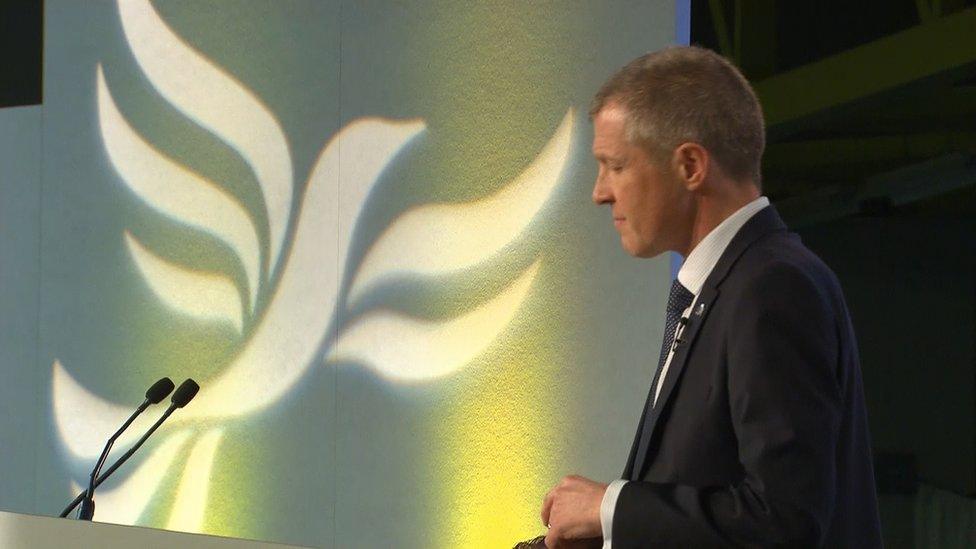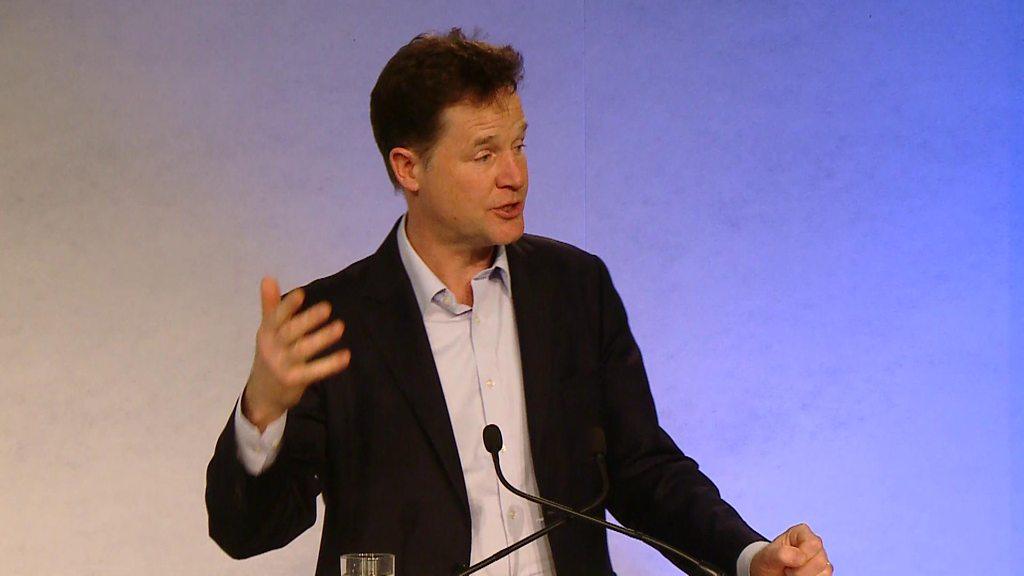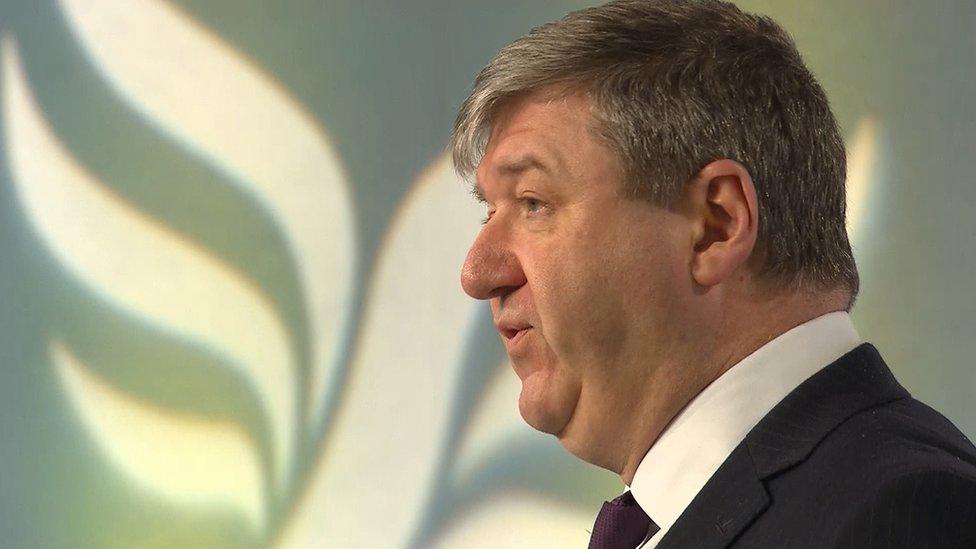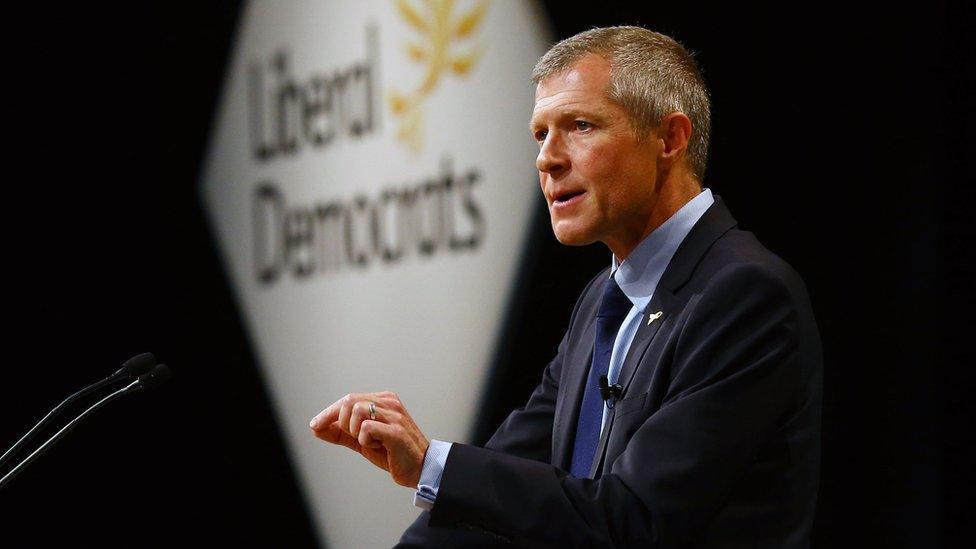Rennie casts stones in constitutional debate
- Published

Willie Rennie has vowed to fight to keep Scotland in the UK, and the UK in the EU
Despite being known as the Roaring Game, there is something innately soothing about the sport of curling. For the spectator, that is.
Out on the wild ice, it is probably nerve-jangling and tense. Will your stone slide past a rival or collide in disastrous fashion? Will your team triumph? And what on earth does Bert mean by those weird gestures at the other end of the rink?
But, looking on, it is all gentle and joyous. I particularly appreciate the various styles of skiting across the ice. Some walk, purposefully. Most slide on one foot, using the other as a propeller.
Then there's the back up. The guy with the pack over his shoulders, Ghostbuster style, who sprays the ice. The fellow with the huge sweep who keeps the rink level.
Excellent stuff, all round. Engrossing yet gentle. And as Scottish as elephant polo. What's not to like?
All this occurred to me as I spent a few moments catching up with the contest during the lunch break at the Liberal Democrat conference in Perth. What? You thought I plunked out of their debate on Scotland's future? Never, never.
No, no, this was but a passing moment of distraction. Actually, I have long associated the Lib Dems with curling ever since Paddy Ashdown held a photocall at a rink in Pitlochry. The accompanying wicked media tried to get him to throw a stone or two on the ice.
"You just want me to fall on my backside", he declared. In mute shame, we nodded as one. It was true, only too true. (Except for "backside". He used another word, probably picked up in the Navy.)
Curiously content
But back to the Lib Dems. They too appear curiously content, as if they had spent a few valuable minutes on the rink rather than squabbling with their chums about the wording of a rule change in standing orders.
They think they are relatively well placed in these troubled times, offering a combination of supporting both the UK and the EU. Those were, remember, the verdicts of the Scottish people in two plebiscites.
Not content with these glories, they seem to be anticipating a rerun in both cases. With different degrees of fervour. Willie Rennie, he who leads the Scottish party, says that indyref2 is unwanted and unnecessary.
Yet his speech was founded upon the presumption that such a ballot is coming reasonably soon. Perhaps he took his clue from the interview with me in which the first minister agreed that indyref2 was now "all but inevitable". Or the many other interviews in which she has deployed comparable comments.

Either way, Mr Rennie says his party is ready for the fight. The economic case for independence, he said, is now less impressive, particularly in the light of oil figures.
But, he said, there was an emotional case for the Union too. He, Rennie W, was ready to deploy said argument. It was, he said, about "family, community and destiny". (Theresa May opted for "solidarity, unity, family.")
On the subject of the EU, Mr Rennie also anticipates a further referendum. Although he tends to bristle, politely, if one suggests it is a rerun of 23 June.
Not so. It would be, apparently, a first referendum on the Brexit terms. However, as Nick Clegg made clear to me in an interview, it would be feasible that the options are: accept the terms or stay in the EU. So it sounds a bit like a rerun, doesn't it?
Mr Rennie dissents and, in any event, there is fierce resistance to the concept from the UK government. Mr Rennie counters that by claiming that support will grow as the grim nature of Brexit becomes apparent.
Somewhat coy
But he had another point to make in his speech. He claimed the SNP were prepared "to sell out Europe in a desperate bid to win independence."
Evidence for this assertion is a little limited. Hints that some in the SNP might be prepared to accept EEA membership, perhaps, rather than the full EU. Jim Sillars' declaration that he would abstain in a future independence referendum if it involved rejoining the EU.
But Mr Rennie may - I stress may - be on to something when he suggests that one or two in the SNP have been somewhat coy about the future of Scotland within the EU. Only a little. Just a touch.
Perhaps reflecting two factors. The Scottish government's adherence to the EEA as a distinct alternative to complete withdrawal from the single market. If that were to be conceded, might it become the new status quo - and mildly appealing?
Factor two, that a fair proportion of those who voted Yes in 2014 also voted Leave in 2016. They are (or were) persuaded by independence but don't warm to the EU. Is there perhaps just a tiny dose of vacillation because of that divergence in the Yes community?
All entertaining stuff from Mr Rennie, then. But it led him to a rather courageous conclusion, revisiting 2014. He argued that the "best way for us to stay in the European Union is through the United Kingdom".
What's that again? The United Kingdom led by Theresa May who is about to trigger Britain's departure from the EU? A prime minister who says Britain must leave the single market? The UK with a government who says the vote of 23 June is irreversible?
Yes, that UK. Mr Rennie's argument is that there is now "a momentum in the UK for change". Evidence for that? The Lib Dem victory in the Richmond Park by-election where the candidate ran an anti-Brexit campaign.
Well, maybe. But I think waverers might need a mite more convincing than that. But Mr Rennie's conclusion is broader still. It is that the Lib Dems can now represent a majority in Scotland - that pro EU and pro UK combination again.
Now, he says, the challenge for his party - which has struggled in recent Holyrood and Westminster elections - will be to translate that putative position into solid votes.
If he can pull that off, he will be entitled to a few contemplative moments casting a stone on the ice.
- Published10 March 2017

- Published10 March 2017

- Published10 March 2017
